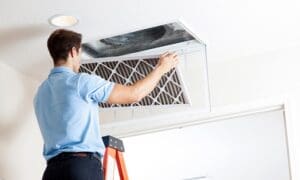
How does indoor air quality affect your health?
Poor indoor air quality can affect your health and has serious health consequences. Exposure to indoor air pollution can trigger allergies, cause eye irritation, headaches, fatigue, and even lead to lung cancer and diseases. Protect yourself and your loved ones by ensuring healthy air quality indoors. Let Alaskan Air Conditioning & Heating help you improve your indoor air quality in your Phoenix home.
Poor air quality caused by dust mites, pet dander, mold spores, and secondhand smoke particles can lead to serious health problems. Inhalation of these pollutants is a daily threat to people of all ages and can result in adverse health conditions.
To ensure optimal health, it’s essential to thoroughly purify and clean indoor air, preventing any adverse health outcomes.
Indoor Air Pollution: Risks and Solutions
High levels of Indoor air pollution pose a serious threat to our health. Without proper ventilation, pollutants accumulate and become concentrated, exposing us to potential health hazards. This higher risk is compounded by prolonged exposure and low dilution from outdoor air.
We must implement adequate ventilation in our homes and workplaces to ensure our safety. Doing so can minimize the potential risks and promote healthy indoor air quality. Don’t let indoor air pollution go unnoticed – take action now for a safer and healthier indoor environment.
How Pets Can Affect Indoor Air Quality
Pets can bring comfort to our homes. However, they can also introduce air contaminants like hair, dander, saliva, feces, and urine. Additionally, pests like mice, dust mites, and cockroaches can contribute to poor indoor air quality.
Recognizing the effect pets have on the air quality in our homes is essential. We must take steps to address this concern. Discover how to improve indoor air quality despite having pets and pets-related pollutants.
What are some types of contaminants?
Indoor air quality is crucial to our health and well-being. However, many factors, including daily activities, building materials, and pollutants, can negatively impact it.
Smoking cigarettes and burning solid fuels can release dangerous vapors into closed environments. Avoid these activities indoors to limit their impact on indoor air quality.
Additionally, construction projects may produce harmful chemicals in furniture and equipment. It’s essential to consider the materials used in any renovation or construction project and their potential impact on indoor air quality.
Biological contaminants like mold spores and allergens can quickly spread throughout indoor spaces. Regularly cleaning and maintaining these areas is essential to stop the effects of indoor air pollutants.
Some examples of contaminants that are in homes:
- Allergens – These tiny particles can trigger a troublesome immune system response, lingering on fabrics for months and spreading through the air. Don’t underestimate their omnipresence – allergy sufferers beware of unexpected bouts of distress.
- Carbon Monoxide – Carbon monoxide is a severe danger in the air created by familiar sources like cars and furnaces. This harmful gas can impact anyone, regardless of age or health. Install efficient ventilation systems in all combustion devices to protect yourself from carbon monoxide buildup. Don’t take any chances with this hazardous gas – protect your health today.
- Lead – Lead is a versatile metal that finds use in various applications beyond powering our vehicles and colorizing our homes. Its unique properties enhance the beauty of ceramics with rich textures and enable plumbing systems to operate efficiently. Let’s explore how this remarkable metal drives innovation in diverse industries.
Other examples of contaminants include:
- Mold – No one is entirely immune to mold and its harmful effects. Fungi love moisture, and homeowners must keep their living spaces dry. Prevent the growth and spread of these microscopic organisms by taking precautions against dampness.
- Formaldehyde – Formaldehyde, a commonly used component in home furnishings, is known for its pungent smell and potential carcinogenic effects. Formaldehyde is in various materials, including pressed wood furniture, cabinets, flooring, carpets, and fabrics. Consumers should know that formaldehyde can also be present in glues, adhesives, paints, and coatings.
- Pesticides – Pesticides are effective weapons against pests that threaten the health of your plants. Defending against bugs, weeds, and other intruding organisms is essential. However, it’s crucial to remember that pesticides can also harm indoor air quality. Stay safe while protecting your plants by handling pesticides with caution.
- Smoke – Toxic chemicals like formaldehyde and lead are commonly found in smoke and produced through various combustion processes. This dangerous pollutant can be present in cigarettes, cookstoves, and wildfires, all posing potential health risks to individuals exposed to them.
Improving indoor air quality is critical to maintaining a healthy living and working environment. We can take steps to ensure cleaner and safer indoor air. To do this, we must limit activities that release pollutants. Additionally, we should be mindful of the materials used in construction and renovation.
Improved Home Air Quality with Tailored Solutions
Discover tailored solutions to enhance your home air quality today. Our team of experts is experienced in advanced sealing techniques. They use these techniques to block off hazardous substances. Additionally, they adjust gas stoves to reduce harmful emissions.
Our innovative solutions help create a healthier and more comfortable living space for you and your family. Convenience is not compromised. Contact us today to learn more about how we can help improve your home’s air quality.
Ensure Clean Indoor Air with HVAC Filters
Protect yourself from poor indoor air quality that can affect your health by ensuring you have clean air filters. Breathing clean air is essential to maintain good health. HVAC system filters effectively keep harmful contaminants and particles out of your home. AC filters ensure you can breathe easily, especially for people with lung diseases such as asthma or young children. Additionally, when outdoor pollution levels are high, you can use recirculation modes that help reduce the intake of external pollutants indoors.
Investing in an efficient air purifier is wise. It is beneficial if you have less severe bacteria or allergens in your home environment. Keep your indoor air quality at its best with HVAC filters and purifiers.

